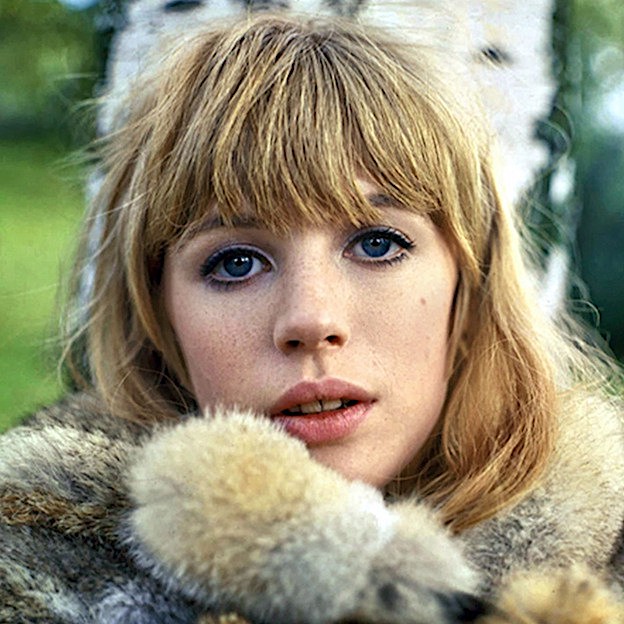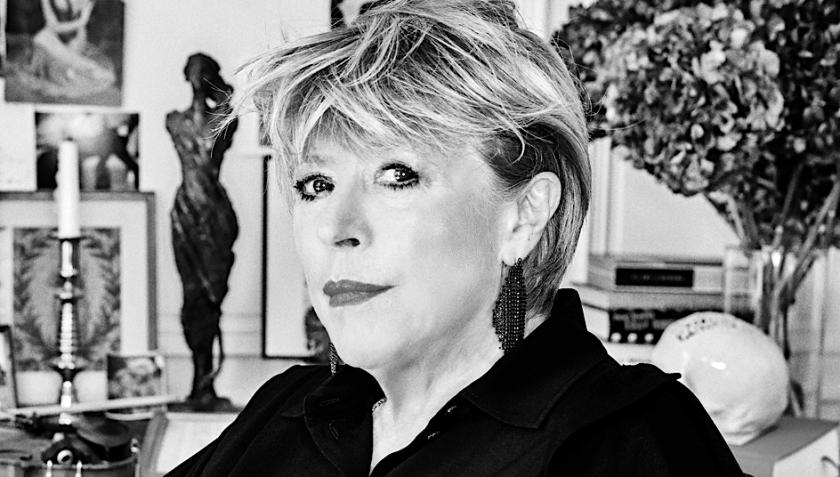French actor and director Sandrine Bonnaire’s warm, langorous film portrait of la Faithfull may not the first – that accolade goes to Michael Collins’s feature-length Dreaming my Dreams (2000), featuring Mick, Keith, Anita and John Dunbar – but it does feel like a refreshingly deep-focus, specifically female take on her life and mythos, intimate yet kept at a decorous arm’s length by its subject, who by turns seems to want to open up while firmly closing her atelier doors on too much interior revelation. There are several times in the film when she holds her hand up to Bonnaire, asking her, and then telling her, to STOP.
Faithfull’s is a well-examined life, often lived under the lustful-prurient gaze of others. It’s a life with as many twists and turns as a labyrinth, and with a monster at its centre. A sacred monster – Faithfull herself, battling angels and demons and letting the smoke drift around her nostrils as she speaks, singing the lyrics to “Vagabond Ways”. Andrew Loog Oldham, her first manager, summed up her teenage persona as “an angel with big tits” – impeccable lingua franca for a Sixties pop starlet in Swinging London. In the documentary’s opening scene, it’s this waif-like, naive-sophisticated teenager we see, mumbling in French and pulling on a ciggie, head down, while her older self beadily observes her on a TV screen, pulling on her own ciggie, the present-day chanteuse, long-settled in Paris, observing her wraith-like waif self as if through the wrong end of a telescope (pictured below, Sixties Marianne).
 If you know much about Faithfull, you’ll find much that is familiar here, though the archive footage – interviews and performance – is marvellous. What makes it different is its tone. Being French, made by a female actor/director, and without any of the generally blokeish Mojo-isms and rock cliches that can rapidly infect even the healthiest-looking music doc, this portrait is warm and colour-saturated, unhurried and revealing in its own measured way.
If you know much about Faithfull, you’ll find much that is familiar here, though the archive footage – interviews and performance – is marvellous. What makes it different is its tone. Being French, made by a female actor/director, and without any of the generally blokeish Mojo-isms and rock cliches that can rapidly infect even the healthiest-looking music doc, this portrait is warm and colour-saturated, unhurried and revealing in its own measured way.
Faithfull borrowed the title of her second volume of memoirs (Memories Dreams and Reflections) from Jung, and there is a strong streak of Jung’s dynamic world of archetypes in her work, her music, her life and her mythology. She’s one kind of goddess in the early folk-pop years, gazing into middle distance and catching no one’s eye as she sings, and quite another in Girl on a Motor Cycle, zipping up black leather around a naked torso. “Sister Morphine”, written with Jagger, presents yet another archetypal face, a forbidden and transgressive one, from which she will draw her later power even as it almost destroys her.
After an overdose in Australia, she wakes after six days in a coma to become the girl on the wall in Soho, dependant on the kindness of strangers, friends like Francis Bacon, and books like Naked Lunch. It’s this archetypal Lilith figure, the wild and untamed woman alone, that rises up to create the full exposure and mature testament of 1979’s Broken English, the work that changes everything for Marianne, and turns a victim into a protagonist, a junkie into a survivor, and an interpreter into artiste who knows full well of what she speaks and sings. That’s the Marianne Faithfull we encounter in close-up here, before Sandrine Bonnaire’s probing camera. She’s a piece of work, and a real wonder. This is a film that will make those who listen to her and love her, love her that much more















Add comment